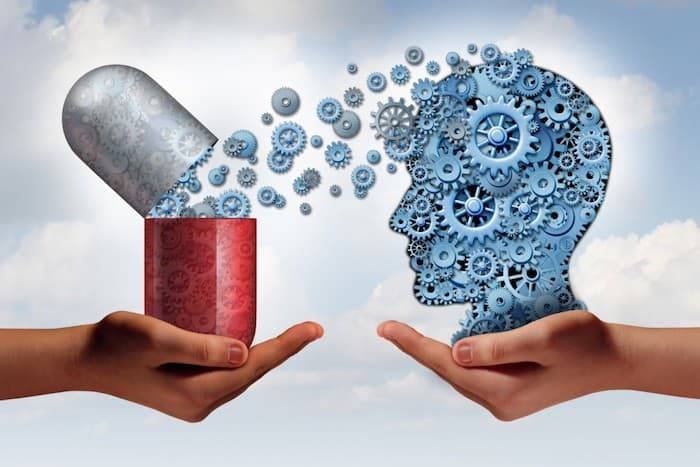All psychoactive substances influence the mental health of a person by affecting their mood, behavior, sleep patterns, short-term memory loss, etc.
Everyone’s mental health is unique and might be affected differently while using drugs for recreational or other purposes, which can lead to unpredictable effects on the mood of a person. While it may make someone restless or impulsive, it could have the opposite effect on someone else.
According to a survey conducted by the Substance Abuse and Mental Health Services Administration in 2018, around 9.2 million adults reported experiencing a drug-induced mental health disorder!
Even though each person’s mental health perspective is unique, after years of research, experts have come up with the following common effects that drugs can have on the mental health of a person:
1. Drug-Induced Psychosis
Psychosis is characterized by delusional behavior that renders a person of the ability to differentiate real from imagination. It is one of the most dangerous effects of using drugs and regular use of drugs can trigger repetitive psychosis episodes. Long-term use of drugs like cocaine, cannabis, and particularly hallucinogens causes psychosis and often severe paranoia. Long-term use of drugs also leads to an addiction in which case this is called a “dual diagnosis” or “co-morbid disorders”. Psychosis can also be triggered by mixing two drugs and can have fatal effects! Especially for people with underlying conditions like anxiety, depression or schizophrenia. In such cases, both the addiction and the psychosis need to be treated separately and the treatment might continue for a long time.
2. Muscle Relaxants
Muscle relaxants are medications used to treat muscle pain and muscle spasms. They have sedative effects that relax the muscles and help increase the pain tolerance of a person. But prolonged use of muscle relaxants can lead to addiction especially if combined with other illicit drugs in order to achieve euphoria and a calming effect.
Muscle relaxant and prescription drug abuse can lead to serious mental health problems like hallucinations, seizures, or even death in some cases. Moreover, muscle relaxants are often administered in the treatment of progressive tumors of breast cancer and according to research conducted in 2016 on the effect of muscle relaxants on invasion, adhesion, and migration of breast cancer cells, muscle relaxants can cause tumor recurrence or metastasis. This leads to the conclusion that muscle relaxants should only be used as a last resort and on doctor’s prescription for short-term use of 2-3 weeks.
3. Anxiety And Depression
Drug abusers often claim that they use drugs to relieve their anxiety and depression, and most of the time they are unaware that drugs can actually lead to worsened anxiety than they were experiencing before. Prolonged use of drugs for these purposes can lead to addiction and worsen the symptoms. If treatment is not administered in time, it can cause problems in the personal and social life of a person. It can also lead to paranoia and hallucinations which can severely damage both the mental and physical health of a person.
4. Anger Management Issues
People often take drugs to relieve stress and deal with negative feelings they experience due to it. Stress is known to be a leading cause of alcohol and drug addiction because while it may provide temporary relief from stress, continued use can be counterproductive. This can make a person restless and irritative which leads to aggression. Such people tend to get into fights more often and develop severe anger management issues. This can have a very negative effect on the social and personal relationships of a person and they can start feeling isolated and more stressed than they were before using drugs.
Drugs not only make a person weak and dependent physically but also have serious effects on their mental health. Treatment of the mental health disorders caused by drugs can be administered in both inpatient and outpatient treatment facilities where mental health professionals provide counseling and other options for treatment suited to the needs of a person. In most cases, inpatient treatment is preferred along with rehabilitation for long-term positive effects, and once a person has recovered, they can continue outpatient treatment and counseling. So if you think a loved one might be suffering from comorbid disorders, make sure you help them seek the right treatment options in time!
My name is Sardar Ayaz a professional content writer and SEO expert having Proven record of excellent writing demonstrated in a professional portfolio Impeccable grasp of the English language, including idioms and current trends in slang and expressions. I have ability to work independently with little or no daily supervision with strong interpersonal skills and willingness to communicate with clients, colleagues, and management.
I can produce well-researched content for publication online and in print, organize writing schedules to complete drafts of content or finished projects within deadlines. I have 12 years’ experience to develop related content for multiple platforms, such as websites, email marketing, product descriptions, videos, and blogs.
I use search engine optimization (SEO) strategies in writing to maximize the online visibility of a website in search results
